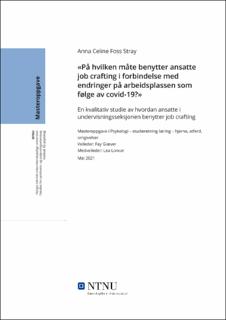| dc.description.abstract | Hensikten med denne kvalitative studien er å utforske hvordan ansatte i undervisningssektoren benytter job crafting i møte med endringer på arbeidsplassen som en følge av covid-19. Dette er en yrkesgren som i likhet med mange andre har gjennomgått store endringer på arbeidsplassen som en følge av covid-19. Endringen består i hovedsak i arbeid fra hjemmekontor og en økt digitalisering. Arbeidsoppgavene oppleves likevel å være de samme som tidligere, men utføringen av dem ble etter endringene annerledes. Det ble utført semi-strukturerte intervju av fem ansatte ved universitet og høyskole. Fortolkende fenomenologisk analyse ble benyttet som analyseverktøy i studien.
For å håndtere endringene på arbeidsplassen benyttet de ansatte job crafting. Studien viser at de ansatte har benyttet alle de tre strategiene for job crafting: oppgaverelatert job crafting, relasjonell job crafting og kognitiv job crafting. For å håndtere den økte digitaliseringen og bruken av hjemmekontor endret de ansatte rekkefølgen arbeidsoppgavene ble utført i, og tok flere pauser i løpet av arbeidshverdagen. Den økte bruken av hjemmekontor førte til en mangel på sosial kontakt med kollegaene. For å håndtere dette iverksatte de ansatte samtaler og chatter. Videre valgte de å utføre arbeidet på arbeidsplassen med jevne mellomrom til tross for at anbefalingene var å holde hjemmekontoret. Dette gjorde de for å oppnå litt sosial kontakt med kollegaene. Den kognitive job craftingen de benyttet var å endre tankegangen, og å øke positiv refleksjon rundt situasjonen og endringene. Fremtredende motivasjonsfaktorer var behovet for sosial støtte og behovet for kontroll, men det var ingen fremtredende behov for et positivt selvbilde. Funnene underbygger dermed antakelsen om at alle de tre behovene kan tilfredsstilles andre plasser enn i arbeidet. Det antas at de tre behovene ikke behøver å være til stede før job crafting benyttes. Derimot viser funnene at opplevd autonomi er en viktig faktor for at job crafting skal forekomme.
Studiens funn anerkjenner utfordringene som den økte bruken av hjemmekontor og digitalisering kan medføre, og ser på job crafting som en effektiv strategi for å håndtere dette. Videre samsvarer studiens funn med tidligere forskning på job crafting. | |
| dc.description.abstract | The purpose of this qualitative study is to explore how employees in the educational sector uses job crafting in response to the changing work environments as a consequence of covid-19. This is a profession, like many others, that has undergone major changes in the workplace as a result of covid-19. The main changes consist of working from a home office and increased digitization. The tasks were perceived to be the same as before, but the execution of them became different than before/previously. Semi-structured interviews were conducted with five employees at universities and colleges. Interpretive phenomenological analysis was used as an analysis tool in the study.
In order to handle the changes in the workplace, the employees used job crafting. The study shows that the employees have used all three strategies within job crafting: task-related job crafting, relational job crafting and cognitive job crafting. In order to deal with the increased digitalization and use of a home office, the employees changed the order in which the work tasks were performed, and took an increased number of breaks throughout their workday. The increased use of a home office led to a lack of social interaction with colleagues. To deal with this, the employees initiated conversations and chats online. Furthermore, they chose to carry out the work in the workplace occasionally, despite opposing recommendations that advised to stay in the home office. They did this to gain some social interactions with their colleagues. The cognitive job crafting they used was to change their way of thinking, and to increase their positive reflection on the situation and the changes. Prominent motivational factors were the need for social support and the need for control, but there was no prominent need for a positive self-image. The findings thus support the assumption that the three needs can be met elsewhere than in the workplace. Furthermore, it is assumed that not all three motivators need to be present before job crafting is utilized. The findings show that perceived autonomy is an important factor for job crafting to occur.
The study´s findings recognize the challenges that increased use of a home office and digitalization may entail, and where job crafting may prove to be an effective strategy for dealing with these problems. The study´s findings are consistent with previous research on job crafting. | |
